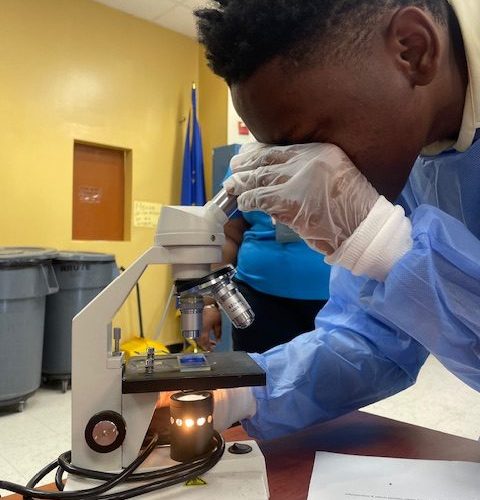Phyl’s Academy is a hub of innovation, where students dive into hands-on learning that extends beyond the traditional classroom. Today, we’ll take you through a day in the life of our upper school students, experimenting with science-focused concepts. (Photos Below)
Grade 7: Earth and Space Science – Testing Soil Acidity and Alkalinity
Our Grade 7 students have been getting their hands dirty—literally! Their recent project involved testing the acidity and alkalinity of different soil samples, aligning with their Earth and Space Science curriculum.
Armed with pH indicators and soil samples from various environments, the students worked in teams to analyze the pH levels. Students were able to see the direct impact of pH balance on ecosystems, gaining a deeper understanding of environmental science. The experiment introduced them to concepts like acid-base chemistry, and emphasized the importance of soil health in agriculture and conservation.
Grade 8: Physical Science – Constructing Catapults
What better way to learn about physics than through a medieval engineering marvel? Grade 8 students have been hard at work building their very own catapults as part of their Physical Science course. This hands-on project challenged students to apply principles of mechanics, including force, tension, and projectile motion.
Students worked in small groups to design and construct functional catapults, which they then tested by launching objects at varying distances. They were tasked with calculating the force and trajectory, helping them make connections between theory and practical application. This activity provided an engaging way to explore Newton’s Laws of Motion while sparking creativity and collaboration among students.
Grade 9: Biology – Making Cheek Cell Slides
Grade 9 students have recently donned their lab coats to step into the world of microscopy in their Biology class. Their experiment? Creating cheek cell slides for a closer look at human biology.
After gently swabbing the inside of their cheeks, students prepared slides to observe their own cells under a microscope. They were able to identify key cellular components such as the cell membrane, cytoplasm, and nucleus. This experiment not only gave students a first-hand look at cellular structures but also introduced them to important lab techniques, such as using a microscope and preparing biological samples. By the end of the class, they gained a deeper understanding of the human body’s microscopic building blocks.
Grade 10: Chemistry – Investigating Acidity and Alkalinity of Various Liquids
Grade 10 students took their chemistry knowledge to the next level by conducting an experiment to investigate the acidity and alkalinity of various liquids. The students tested everyday substances, from household cleaners and juices to soft drinks and water, using pH strips and indicators.
This experiment gave students a real-world understanding of how pH levels affect the chemistry of substances, which is essential knowledge in fields ranging from medicine to environmental science. The experiment also demonstrated how acids and bases interact with each other, and students were encouraged to think critically about the implications of pH in daily life—whether it’s maintaining safe drinking water or balancing the acidity in food production.
Grade 11: Physical Science – Advanced Catapult Engineering
While the Grade 8 students were getting their first taste of catapult construction, the Grade 11 students took it a step further in their Physical Science class. Their task? Build more advanced catapults, incorporating more intricate designs and additional physical principles.
Grade 11 students were introduced to the concept of torque, angular velocity, and energy transformation in greater detail. After building their catapults, they tested them by launching projectiles of different weights, measuring how mass and force affect distance and accuracy. This hands-on project not only honed their engineering and design skills but also solidified their understanding of the complex mechanics behind real-world applications.
—
The Benefits of Science-Focused Learning at Phyl’s Academy
At Phyl’s Academy, science isn’t just something students read about in textbooks—it’s something they experience firsthand. Through a variety of experiments and practical applications, students at every grade level are able to:
– Develop Critical Thinking Skills
– Enhance Collaboration
– Apply Theoretical Knowledge
– Prepare for Future STEM Careers
In conclusion, the recent science-focused activities at Phyl’s Academy highlight the school’s commitment to providing engaging, hands-on education. From testing the pH of soil and liquids to constructing catapults and observing human cells under a microscope, students are immersed in experiments that make learning both fun and meaningful. Science-focused projects not only help students grasp complex scientific concepts but also inspire a lifelong love of discovery and innovation.
Phyl’s Academy continues to pave the way for the next generation of scientists, engineers, and thinkers, one experiment at a time.



